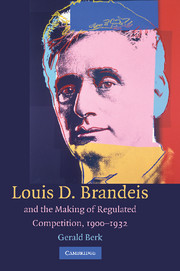Book contents
- Frontmatter
- Contents
- Figures and Tables
- Acknowledgments
- 1 Creative Syncretism
- PART I BRANDEIS AND THE THEORY OF REGULATED COMPETITION
- 2 Republican Experimentalism and Regulated Competition
- 3 Learning from Railroad Regulation
- 4 The Origins of an Ambiguous Federal Trade Commission
- PART II REGULATED COMPETITION IN PRACTICE
- PART III REGULATED COMPETITION CONTESTED
- PART IV CONCLUSION
- Appendix Industries and Number of Associations with at Least Substantial Involvement in Developmental Association, by Industry Group
- Index
3 - Learning from Railroad Regulation
Published online by Cambridge University Press: 23 November 2009
- Frontmatter
- Contents
- Figures and Tables
- Acknowledgments
- 1 Creative Syncretism
- PART I BRANDEIS AND THE THEORY OF REGULATED COMPETITION
- 2 Republican Experimentalism and Regulated Competition
- 3 Learning from Railroad Regulation
- 4 The Origins of an Ambiguous Federal Trade Commission
- PART II REGULATED COMPETITION IN PRACTICE
- PART III REGULATED COMPETITION CONTESTED
- PART IV CONCLUSION
- Appendix Industries and Number of Associations with at Least Substantial Involvement in Developmental Association, by Industry Group
- Index
Summary
Brandeis formulated a blueprint for a federal trade commission from his experience with railroad regulation. He learned about the limits of progressivism and applied economics when he became involved in a series of Interstate Commerce Commission (ICC) rate cases between 1910 and 1914. Although he was a partisan participant, and his side won, Brandeis came to see railroad regulation as a failure. Instead of realizing the progressive promise to autonomy, legitimacy, and objectivity, applied economic science led to stalemate and paralysis. Brandeis proposed an alternative, which I call cultivational administration. Although the ICC did not take up his proposal, it became the basis for his Federal Trade Commission design and, as we shall see in Chapter 4, a third way to organize a commission. This chapter explains what Brandeis learned from railroad regulation and outlines his alternative.
Brandeis's relationship with the engineers flourished in railroad regulation, where they taught him new ways to think about efficiency and regulation. He consulted them on matters of railroad efficiency, enlisted their service as expert witnesses, and drew on their expertise to craft an alternative design for railroad regulation. And as he did, he deepened the chasm between the way engineering and economics approached the construction of knowledge. He learned four lessons from the engineers, which would reshape his understanding of economic efficiency and regulation. First, railroad cost accounting practices short-circuited improvement, because they prized volume over all other ends. Second, the economists who designed railroad rate regulation mistakenly reified railroad accounting practices as scientific law.
- Type
- Chapter
- Information
- Publisher: Cambridge University PressPrint publication year: 2009



